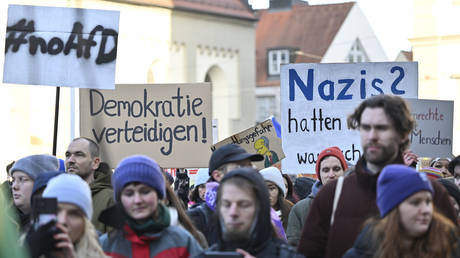Has the German Right Wing Truly Achieved a Major Breakthrough, or Is It Just Perceived That Way?
The prospective next chancellor aims to implement the migration policies of the right-wing AfD while keeping the party at arm's length.. source:TROIB RTS

At the center of this turmoil is Friedrich Merz, leader of the mainstream conservative party and the likely candidate for chancellor, who has focused on migration as a key issue. Following several violent incidents involving individuals from Afghanistan, Saudi Arabia, and Syria in cities like Mannheim and Solingen, Merz introduced a set of measures aimed at tightening migration policy in the German parliament.
The parliamentary process began with a non-binding resolution, which was debated on January 29, and then moved to a formal law proposal on January 31. The initial resolution was passed, but the proposed "influx-limiting law" ultimately failed, with Merz losing crucial support from within his own party, as 12 members withheld their votes.
Observers, including those at Bloomberg, have deemed this defeat a significant setback for Merz, particularly because the loss was influenced by members of his own party. However, the broader context reveals why this moment might be more complex than it appears.
Migration policy remains a highly contentious issue in Germany, often ranking at the top of voter concerns. According to various polls, migration is currently regarded as the most pressing issue by many, overshadowing topics like the economy and inflation. Merz's proposal gained traction, in part, due to its implicit invitation for the far-right AfD party to align with his views, despite his public denials of any intent to ally with them post-election. He stated, “what is objectively right [read: my ideas] does not turn wrong because the wrong ones [read: the AfD] agree with it.” Nevertheless, his actions led to a scenario in which a centrist party supported the AfD to counter other center parties.
Merz had previously committed to avoiding such collaborations, and former chancellor Angela Merkel has criticized him for this apparent flip-flop. However, while her criticisms resonate, they lack potency because, in politics, shifting positions can be both commonplace and sometimes necessary.
Merz has pointed fingers at Merkel, attributing the migration crisis and the rise of the AfD to her tenure. This criticism has found an ally in Sebastian Kurz, the former chancellor of Austria, who weighed in through Germany's conservative media landscape. Kurz's historical governance alongside far-right elements adds a layer of complexity to the discourse around Merz's current positioning.
If we consider the legality of Merz's proposals, many appear at odds with EU laws. For instance, his plan to refuse migrants at an intra-EU border without offering asylum claims contradicts European Court of Justice rulings. Yet, bending these rules is not an unusual practice within the EU, leading to selective enforcement of laws based on political convenience.
Critically, the dynamics playing out in Germany may reveal more about the internal political landscape than the broader European context. Merz's maneuvers, despite his recent defeat, could still favor him as public opinion on migration grows increasingly discontented with current policies. Recent polling indicates that a significant majority of Germans are dissatisfied with migration strategies, and many believe that opposition parties like the Social Democrats should have supported Merz's initiative rather than blocked it.
As a result, the electorate's response to these developments remains uncertain. Will they hold Merz accountable for failing to implement desired changes, or will they blame the opposition for obstructing him? This question will likely shape the political narrative leading up to the elections.
Polls show that a majority of Germans approve of Merz's resolution passed with AfD support, but a substantial portion also disapproves of relying on AfD votes to achieve these policies. This indicates a desire among voters for stringent migration policies without an overt association with far-right elements.
Ultimately, Merz's strategy appears less about expanding the scope of acceptable coalition partners in Berlin and more about undercutting the AfD while borrowing their policies. His actions suggest a movement toward assimilating AfD ideas into the mainstream conservative agenda while attempting to keep the party at arm's length.
As for Merz's future, it might be premature to conclude the impact of his recent losses. The persistent discontent regarding migration ensures that the topic remains at the forefront of political debate, and how voters assign blame in the wake of this escalating issue will be key in determining the election's outcome.
Despite his reassurances against cooperating with the AfD, Merz's prior assertions no longer hold water, especially following the backing he secured from them. Moving forward, the self-declared center's unwillingness to enact the policies sought by many citizens may force Merz to reevaluate his stance regarding collaboration with the AfD, especially after high-profile incidents have intensified calls for intervention. If he opts to incorporate the AfD into a governing coalition post-election, it may ironically be the centrists from the SPD and Greens who inadvertently facilitate such a shift.
Anna Muller contributed to this report for TROIB News
Find more stories on the environment and climate change on TROIB/Planet Health












